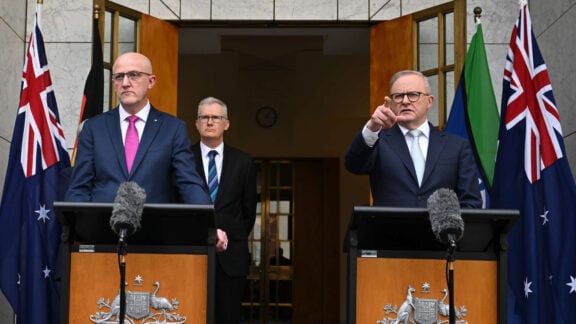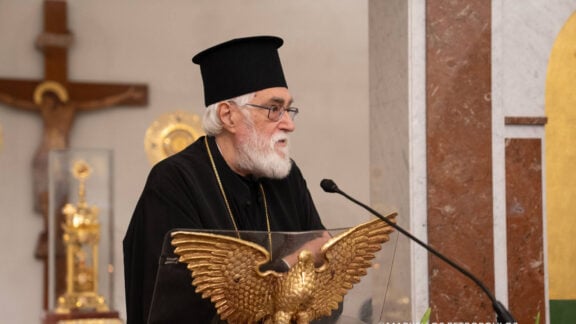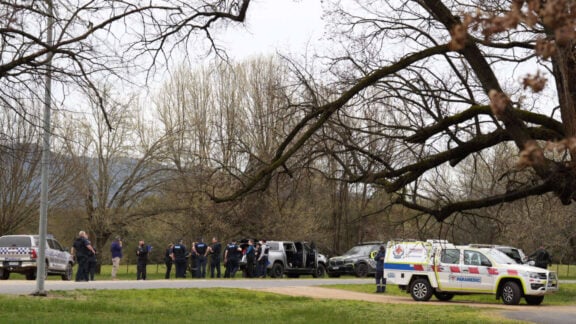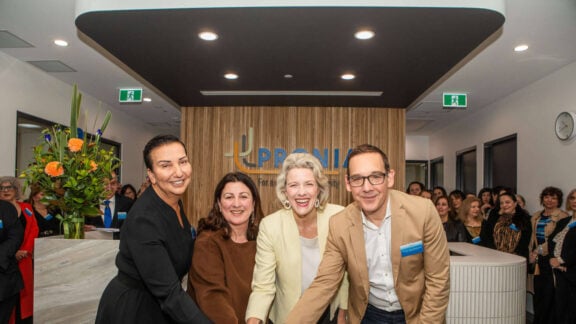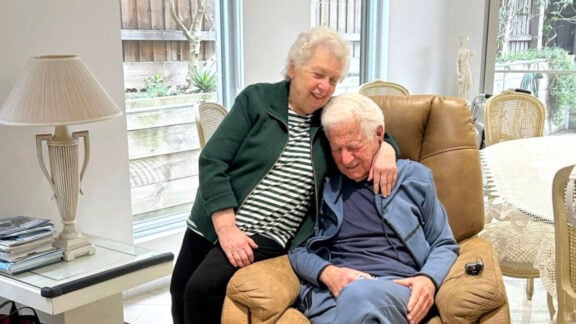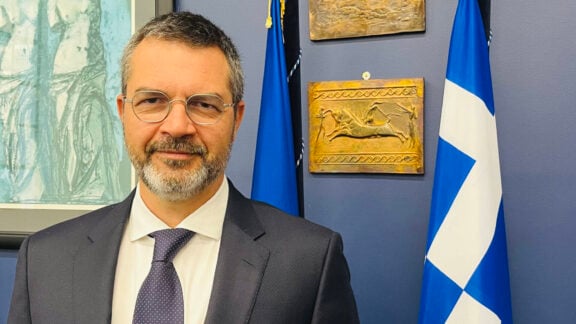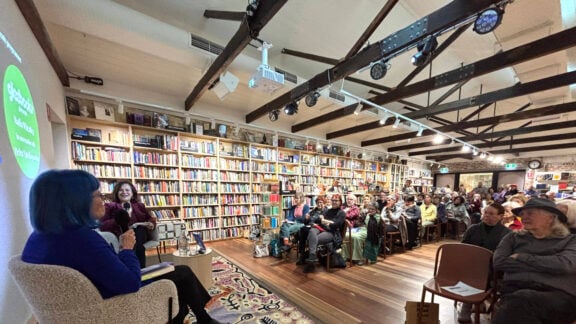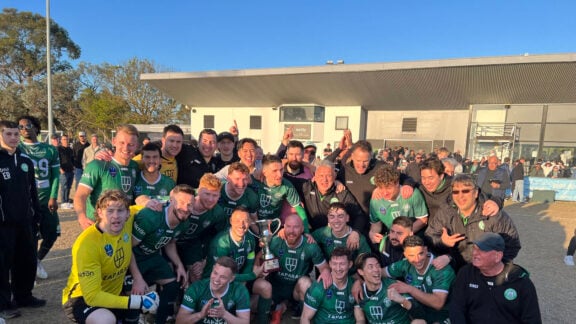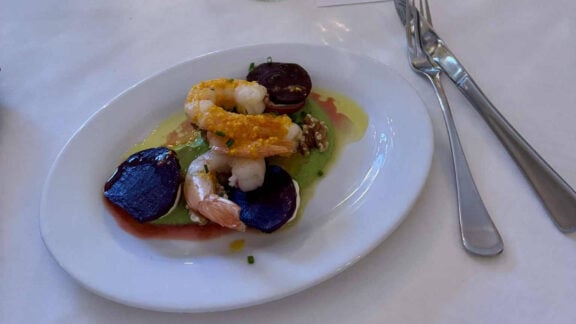Born in 1934 in the cosmopolitan port city of Alexandria, Egypt, Nikos Nomikos has lived a life that reads like a novel — marked by war, migration, poetry, and an enduring love for Hellenism. Now in his 90s, he carries within him a personal archive of memory: of deserts and bomb shelters, industrial workshops and churches, books and brushes. His story is part of the oral history series Our People, Their Stories, a digital archive documenting first- and second-generation Greek migrants in Australia.
“I grew up during the war,” he recalls. “I threw away my schoolbag to play with the Bedouin children by Lake Zahar. That’s how I learned to speak Arabic — fluently and clearly.”
A childhood of contrasts
Nikos’ early years were shaped by both the cultural richness of Alexandria and the looming threat of World War II. His father, Aristidis, a chief engineer from Syros, and his mother, from Chios, passed on the Greek island spirit to their son. Summers were spent in Chios until 1939, when the family fled Greece on the last ship out of Piraeus as war erupted.
Living just 150km from the Tobruk front, Nikos vividly remembers a night that would mark him forever — a bomb exploded outside the shelter, killing his brother, grandmother, uncle, and others. “I stepped out and saw torn bodies, blood, silence and screams all at once. That’s when I began to paint and write poetry — not to show off, but because I was in pain. For me, painting and poetry are one.”

Dreams and signs
During the war, he also had what he describes as a prophetic dream. A Coptic monk appeared near the Nile, and that same night he dreamt of Father Dimitrios — the priest who had married his parents. The priest dropped three metallic eights at his feet. Weeks later, on August 8, his eight-year-old brother was killed in a bombing. “On his cross were carved three eights.”
The path of learning and labour
At St Mark’s College in Alexandria, Nikos excelled in languages — Arabic, Italian, French, Spanish, English — but his heart belonged to poetry. He wrote his first poem at 13 and never stopped. Meanwhile, he absorbed practical knowledge from his father’s work in machinery and metallurgy. “Greeks brought technology to Egypt,” he says. “Factories, foundries, shipyards — we built them.”
In 1960, after the Nasser regime’s rise to power, the family left for Greece. But Greece was not ready for him. “There were no factories. I told them — without industry, there’s no future.” Disillusioned, he left.
Arrival in Australia: “Books in a suitcase”
In 1964, Nikos arrived in Melbourne through the migration scheme run by DÉME (the Greek Migration Bureau), carrying a single suitcase packed with books. “The customs officer looked at me funny when I said ‘Books’ — I told him, ‘Why do you stand before me? What do you carry inside you?'”
His first job was in the foundries at General Motors, a harsh and dangerous environment where many Greeks worked without masks or safety gear. During a major strike, his cousin suggested he try the aeronautics industry. Reluctantly, he applied — and found his calling.
At the Department of Aeronautics, he worked for 31 years as a draftsman, translator, technician — a problem-solver. “I was the one they called when no one else could fix something. When I left, they gave me a farewell card with 62 signatures. Even the scientists didn’t get that.”
Love, family, and faith
Nikos met his wife Sofia at the Holy Trinity Church in Richmond on Good Friday. “She looked so sorrowful… something about her moved me deeply. I was always a solitary man. But she was the one.” They married in 1965 and had three children: Aris, Virginia, and Iakovos. Today, he is a proud grandfather of five.
The artist and the philosopher
Over the years, Nikos has painted over 230 works and written 11 books, with one in a second edition — a recognition that moved him deeply. “When everyone else goes to the beach, I write. Poetry is my sea.”
His paintings hang in hospitals, family homes, and community spaces — a quiet contribution to public life. But it’s his words that carry his soul. “The book is like a person. It speaks. It remembers. My grandchildren search everything on their phones, but I tell them: ‘The button finds, but it doesn’t understand. The book speaks.'”
A voice for Hellenism
What concerns him most today is the erosion of the Greek language and identity in the diaspora. “Greek studies chairs must be re-established in Melbourne. At least two. The community must embrace its youth, or the language will die with us.”
To his children and grandchildren, he offers a heartfelt wish: “Stay close to Hellenism. Love the language, the culture, the roots. Greece for me is the soul of my mother. Hellenism is not always visible — it lives deep inside, in the voice of the heart.”
Between two worlds
Nikos Nomikos’ life stretches across continents, wars, and generations. From the vibrant streets of Alexandria to the still nights of Melbourne, from the noise of machinery to the quiet of a canvas, he has bridged two homelands. A poet, a worker, a witness to history — he has given his life to the preservation of memory, language, and identity.
His story is not just his own — it is the story of a community, of resilience, loss, and the enduring strength of the Greek spirit in the diaspora.
To watch Nikos Nomikos’ full oral history, visit the “Our People, Their Stories” archive.

